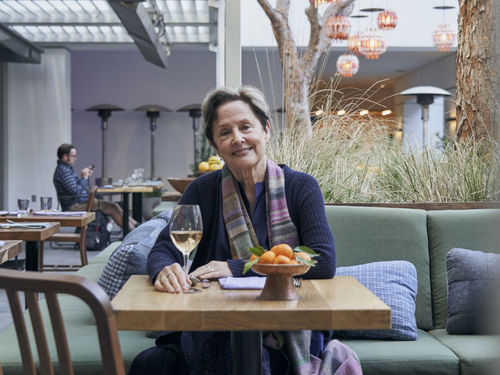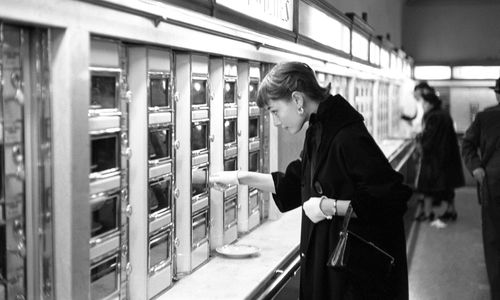
Food and Film: Amuse Bouche
- This is a past program
Co-presented with the UCLA Film & Television Archive.
Our quarterly Food and Film series continues this fall with a tasty sampling menu of short films from around the world. Whether preparing a meal or enjoying it around a table, the culinary experience can subsume the political, cultural and sensuous sides of being all in a single bite. Each film in this program illuminates different facets of our relationship with food and each other from a variety of vantage points. As always, this program was curated with the close collaboration of legendary Bay Area chef and restaurateur Alice Waters, co-founder, with film producer Paul Aratow, of the award-winning Chez Panisse in 1971. The screening will begin with an introduction by Alice Waters .
Repas de bébé (1895)
One of the earliest films shot by Louis Lumière finds Auguste Lumière feeding his infant daughter, Andrée, alongside his wife Marguerite, a simple family scene brimming with sociological and cultural significance and fascination.
DCP, b&w, silent, 1 min. Director: Louis Lumière.
Semiotics of the Kitchen (1975)
A biting parody of cooking shows and a damning deconstruction of the politics of the kitchen. Filmmaker Martha Rosler performs on screen as “an anti-Julia Child” who “replaces the domesticated 'meaning' of tools with a lexicon of rage and frustration.”
DCP, b&w, 6:18 min. Director: Martha Rosler. Courtesy of Martha Rosler and Electronic Arts Intermix (EAI), New York.
Easter Snap (2019)
Carefully and laboriously, among the trees and open air of Alabama, five men resurrect the homestead ritual of hog processing. Amidst steam and stories, elder Johnny Blackmon guides the process of this intimate and tactile communal experience.
DCP, color, 13 min. Director: RaMell Ross.
Historias de Cultura: Oaxaca en Santa Cruz (Comida) (2022)
“Cooking reminds me of being in my land” is the opening remark for this mouthwatering and touching film about food, the recipes that are passed down through generations, and the tastes of Oaxaca found in Santa Cruz, California.
DCP, color, in Spanish and English with English subtitles, 11 min. Director: Megan Martinez Goltz.
Fake Fruit Factory (1986)
A graduate of UCLA’s Ethnographic Film Program, Chick Strand sought to convey the personal experience of her documentary subjects as evidenced here in the close-up framing of women at work making artificial fruit in Mexico but doing so much more as they swap stories, discuss men and commune on a picnic outing.
DCP, color, in Spanish and English with English subtitles, 22 min. Director: Chick Strand.
Jesa (2019)
Jesa is a Korean tradition that honors ancestors, where food is offered. While interviewing her parents, the filmmaker weaves the preparations with their commentary, learning some unexpected things.
DCP, color, in Korean with English subtitles, 7 min. Director: Song Kyungwon.
Bread (1953)
Originally conceived as part of a design lecture at UCLA, Bread plays as a live-action montage that explores, as described by Charles Eames, “The way bread is used in nutrition, bread as an art, bread as a political tool, bread as a symbol.”
DCP. color, 7 min. Director: Charles Eames, Ray Eames.
Werner Herzog Eats His Shoe (1980)
What happens when one filmmaker tells another filmmaker that they will eat their shoe if they lose a bet? What if that losing filmmaker were Werner Herzog, who is true to his word? The result is a delightful document of a feast on footwear. The notorious meal is prepared with the help of Alice Waters at her restaurant Chez Panisse and distinctly filmed by Les Blank. All of this because Errol Morris finished his film.
ATTENDING THIS PROGRAM?
Ticketing: Admission is free. Your seat will be assigned to you when you pick up your ticket at the box office. Seats are assigned on a first come, first served basis, limit one per visitor. Box office opens one hour before the event.
Member Benefit: Subject to availability, Hammer Members can choose their preferred seats and pick up tickets for one additional guest. Members receive priority ticketing until 15 minutes before the program. Learn more about membership.
Parking: Self-parking is available under the museum. Rates are $8 for the first three hours with museum validation, and $3 for each additional 20 minutes, with a $22 daily maximum. There is an $8 flat rate after 5 p.m. on weekdays, and all day on weekends.
Press: If you are a member of the press and are interested in attending and covering the program, please email Santiago Pazos at spazos@hammer.ucla.edu for accommodations.
Read our food, bag check, and photo policies.
♿ Accessibility information










